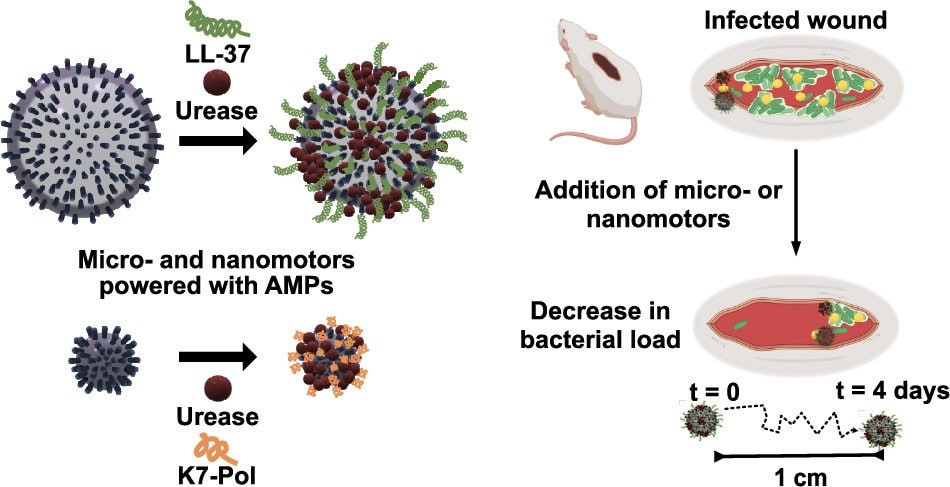
Nanobots were used to treat a mouse’s wound, which was infected with the Acinetobacter baumannii superbug. (Image Credit: ACS Nano 2022, 16, 5, 7547-7558)
Samuel Sanchez, an engineer from the Institute of Bioengineering in Barcelona, Spain, adapted silicon nanobots to deliver antibiotics or cancer drugs through a human body’s viscous fluids to help treat open wounds or infections. So far, he has used them in mice to fight off infections. This approach is quicker than taking antibiotics orally and could be used by medics in the future.
Generally speaking, these bots are a more desirable option compared to drugs due to the diffusion process taking a long time in viscous fluids such as mucous. These often travel to wherever the fluid transports them, which may lead to a missed target.
So the nanobots require propulsion to prevent artificial diffusion from forming. Sanchez then coated urease on a bot’s spherical frame to transform urea into carbon dioxide and ammonia. These proteins were then individually placed around the frame. An enzymatic reaction occurs if the proteins come in contact with the urea, which propels the bots forward, similar to how an internal combustion engine separates gas.
César De la Fuente, a bioengineer at the University of Pennsylvania working with Sanchez, was producing new antibiotics sourced from a protein chain called peptides that naturally occurs in the animal kingdom. He added a synthetically-made antibiotic peptide sourced from wasp venom onto a nanobot’s frame before placing it inside a mouse’s infected wound.
The nanobots randomly propelled themselves after urea was applied to the wound, resulting in a decrease of bacterial content on the infection by 100-1,000 times across the wound’s opening. Treating mice cuts with traditional antibiotic drops or bots without the urea underwent the same decrease in the bacterial matter. This study is only a proof-of-concept, which means it won’t be available in pharmacies anytime soon.
Have a story tip? Message me at: http://twitter.com/Cabe_Atwell

-

kmikemoo
-
Cancel
-
Vote Up
0
Vote Down
-
-
Sign in to reply
-
More
-
Cancel
Comment-

kmikemoo
-
Cancel
-
Vote Up
0
Vote Down
-
-
Sign in to reply
-
More
-
Cancel
Children